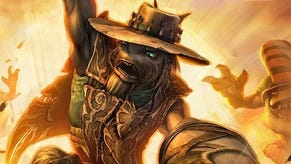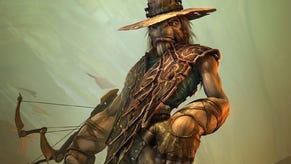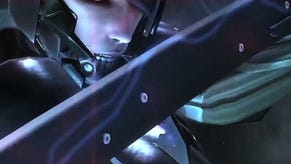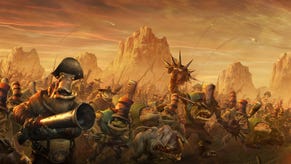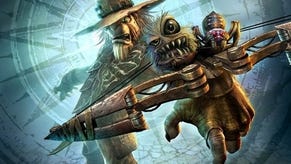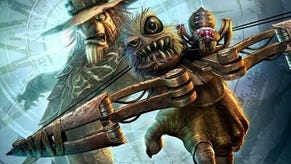Retrospective: Oddworld: Stranger's Wrath
The Weird West.
For that first half, you can feel pretty sure that you know where things are heading. The Stranger - part taciturn early Eastwood, part Harry and the Hendersons off-cut - seems like just another good man in a world gone bad, stalking the ravaged planes and splintering townships of Oddworld's wildest frontiers, hunting down grotesque outlaws in order to earn the Moolah he needs to pay for a mysterious life-saving operation.
The operation intrigues, certainly, but any lingering questions are regularly swept away by the sheer pleasure of the journey itself, the streets filled with dungareed white-trash chickens and drafty fencing, while Stranger's moody sojourns into the deep brush offer a charmingly deranged line-up of gummy-eyed, wattle-jawed biffers to track down and take out.
Things get more complicated, however, when the gravel-voiced hero encounters the peaceful and sad-eyed Grubbs, a helpless subspecies seemingly built for victimhood. Their ancient protectors, the proud and mysterious four-legged Steef, are all but extinct, and that's made the Grubbs easy prey for a villainous industrialist named Sekto, who's cutting off access to their fishing rivers with a towering steel dam.
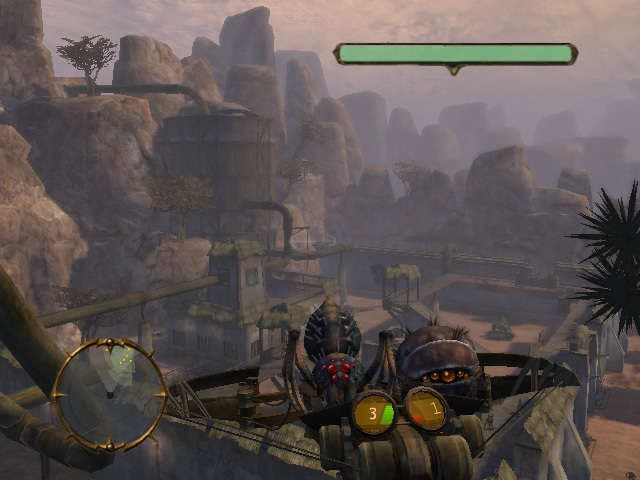
So far, so Chinatown, but Sekto's also responsible for finishing off the Steef in the first place, and wants Stranger to help him hunt down any last remaining stragglers. When Stranger refuses, the game finally plays its hand: captured by the big meany's goons and shorn of his possessions, we discover that Stranger's hulking cowboy boots hide four legs rather than two. He is, in other words, nothing less than the last of the Steef. You may have seen that one coming, but I didn't.
And that's when the mystery of Stranger's surgery finally clicks. The operation he has in mind will free him from those incriminating extra legs, and let him live a life of freedom. Stranger's not a hero then, but something of a coward - saving scrupulously for a grim procedure that will effectively make his own race extinct, abandoning the Grubbs to their fate in the process.
Sharp as he is with that crossbow strapped to his arm, he's turned against Oddworld's problems and injustices, and all he wants an easy life. It's not the first time a title's story and protagonist have been so carefully entwined, but look at the quality of the craftsmanship: Stranger's not the game's lead just because he's some magical Chosen One born to rule, but because he's the ultimate victim, the living, breathing, hard-drinkin' symbol of everything that's gone wrong with this particular world.
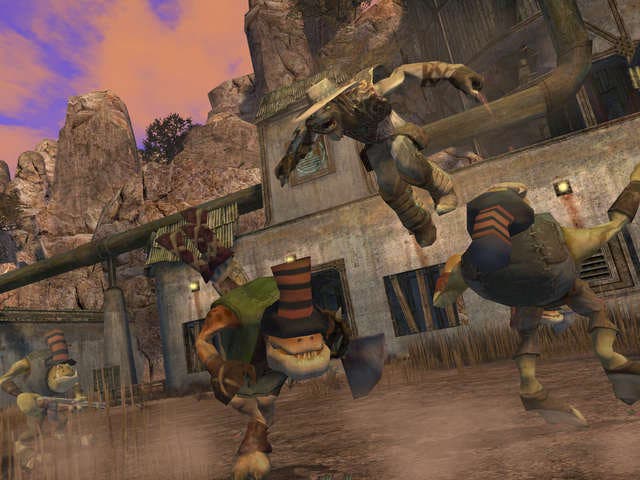
Far more than a simple plot twist, Stranger's Wrath's big shocker hits with the force of a betrayal: you've been Stranger for so long by this point, it seems impossible that he could have kept something like this from you. In one move, Oddworld Inhabitants has deftly hinted at possible complications between the people on either side of the TV screen - gently undermining a relationship which is usually so simple, because games are usually so simple.
Complex, smart, and humane, there's a lot to think about in Stranger's Wrath, and while the trajectory from that point on is inevitably more heroic - there are Grubbs to protect, a dam to destroy, and a final climatic boss smash-up that reveals one last clever twist all of its own - the plot's earned the right to tidy up its loose ends in a more conventional manner: payback has genuinely been earned, for once, and the game's final stretch is as satisfying a rampage as any I've ever played through.
All of which is just lovely, but the last Oddworld game is far more than a laudable chunk of ambiguous narrative. It's also a brilliant shooter and a brilliant adventure game, with huge, rambling levels, memorable enemies, and smart controls. Shifting between first- and third-person perspectives with an ease which makes you wonder why every game doesn't do it, almost every action available to you is inherently satisfying, whether you're constructing a trap, barreling through a cluster of baddies with your giant arms flailing, or sucking a flattened outlaw into your arm-mounted capture can.

